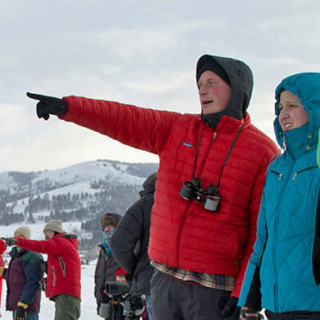Student Spotlight: Cierra Anderson
In this episode, hear from Cierra Anderson—a Master’s in Economics candidate and Law student—who works at the intersection of federal Indian law and economic development in Indian country.
STORY TRANSCRIPT
I'm Cierra Anderson and I'm a third-year law student and a second-year econ master's student at the University of Montana.
So, I'm a member of the Little Shell Chippewa tribe out of Great Falls. And I kind of have always been interested in kind of what makes tribes work and what makes them don't. And ways that they could provide for their members without so much dependence on the government at times.
And when I got into law school and started understanding the different legal frameworks and kind of the reasoning behind why tribes are forced to make the decisions they're making, or kind of where they're, they're impacted unknowingly by the federal government. Then I got really interested in how that impacts the economic development of Indian country.
Economic development is the policies or the tools in place for a community or a government to kind of develop its economy to benefit its members. It’s policies that'll help decrease the poverty levels in reservations, like on reservations, or in Indian country. It'll help increase the employment levels. Things kind of to that nature, increase the GDP. So, it's kind of trying to develop those economies to get them robust enough and kind of going to support their own members. So that they're not having quite frankly, like third world developing problems right here in the U.S.
So, it's trying to solve those issues that impact people who are viewed differently based on the law and federal policies that are in place for a lot of things and try to make those work for the benefit of the tribes.
I am looking at different papers to see what other economists have done, either in regards to federal Indian, like law and policy, and then the economic development. Or, in economic development policies in third world countries or developing countries and trying to find, kind of the idea of where I want to go, like the model I kind of maybe want to apply to Indian country.
If federal Indian law has taught anyone anything it's that general applicability does not work. These tribes are different. They have different needs, they have different resources. They have different access to resources. So, you can't have a one size fits all solution. My goal would be to look at the seven tribes in Montana and the reservations and kind of see what problems they have that are unique to themselves and what problems that are not so unique, that they're more general. And trying to find a solution, of, to work on and fix those issues. But, you can't do that without looking at the law and the legal precedent and the, the implications the law has on decisions made in Indian country, you can't do that without the tribal governments and looking at their statutes and their constitutions and their laws to see how that impacts the decisions they make.
If I had a magic wand and could pick my career for the next four years, I'm torn. So, I really love the policy stuff. I would want to work for the Little Shell, but in Washington, D.C. I think that tribal economic policy is extremely important, but I do think they face unfair burdens from the federal government and the laws that they create. So, I would want to lobby or kind of help shape federal policy at that end to help further the economic development goals of the Little Shell. On the other hand, there's a separate issue. The issue of criminal jurisdiction in Indian country. And so, trying to fix the jurisdictional gap or vacuum that is caused and it's causing a lot of women, particularly in children, in native communities to go missing or they're murdered. And because of the jurisdictional issues that are arising, there's not sometimes a lot that people are willing to do. So, that's kind of where my other heart is still with the tribes, but kind of in the criminal realm as well.
So, I want my tribe to be better and I want them to do better. And I want them just to ultimately try and stem off some of these problems that other tribes have faced before they become problems.
